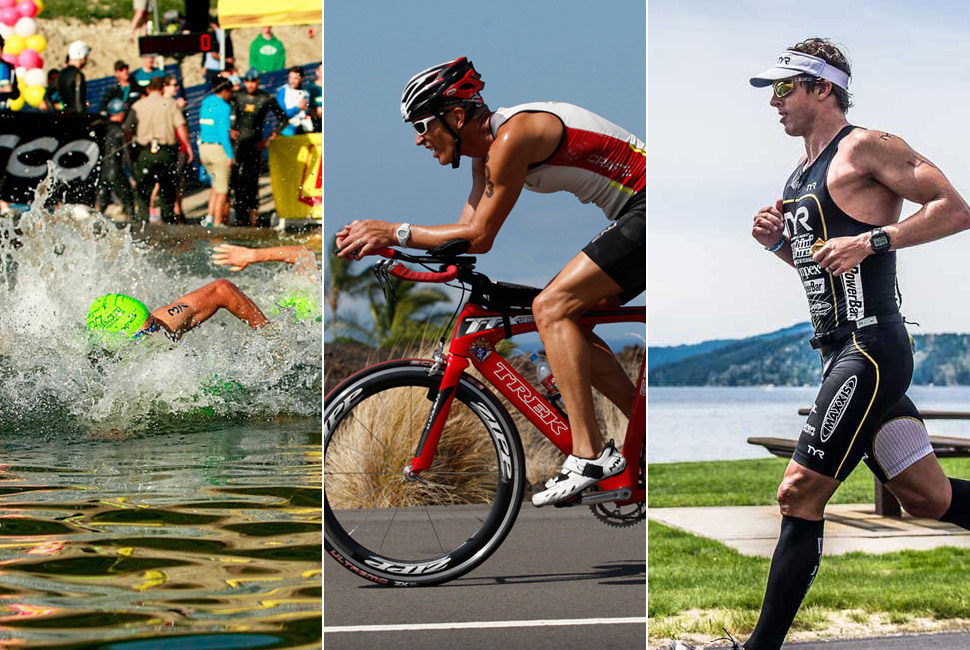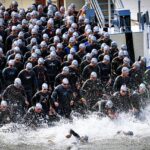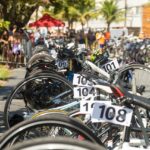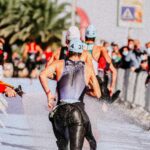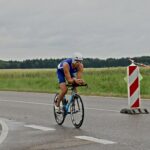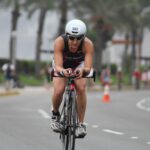When you compete in a triathlon, you will, in fact, be competing in three “races.” I have races in quotes because not all three are actually races. The obvious race is the one that occurs against your competitors. Your goal is to beat as many of them as you can.
But before you can beat your competitors, there is another race you must win, namely, the race against the conditions. The reality is that how other triathletes perform in a race has no bearing on how you perform; rather, your readiness and the conditions determine the quality of your race. There are several very committed “opponents” who will do everything they can to make your race a big fail: weather (hot, cold, raining, windy), water temperature and surface (cold, rough), and road surface and terrain (hilly, uneven) are all doing everything possible to mess you up on race day.
But, in order to overcome the conditions, you must first win the mental race that occurs entirely between your ears. You must be motivated, confident, intense, and focused from start to finish. If you don’t win the mental race, you won’t beat the conditions and you won’t beat your competitors.
The Mind Matters…a Lot
Contrary to what you may think, at whatever level in which you’re competing in triathlon, whether junior, collegiate, age group, or professionally, the technical and physical aspects of our sport don’t usually determine the winner. Triathletes who compete at the same level are very similar in terms of their fitness, their technical capabilities within each event (though there can be considerable variation; some triathletes are stronger in one event than the others), and the quality of their bikes. For example, is Vincent Luis, the men’s 2019 ITU world #1, in better physical condition than the world #2, Mario Mola? Is Katie Zaferes, the women’s 2019 ITU world #1, better technically than the world #2, Georgia Taylor-Brown? In both cases, the answer is probably no. So, on any given day, what separates those who stand on the top of the podium from those who stand on the lower steps (or not at all)? The answer lies in who wins the mental race.
Whenever I talk to triathletes, I ask them what aspect of our sport seems to have the greatest impact on how they perform in training and races. Almost unanimously they say the mental part. I then ask how much time they devote to their mental preparation and their answer is almost always little or no time. Clearly, there is a disconnect between perception and execution with respect to the mental aspects of triathlon.
Despite its obvious importance, the mental side of triathlon is most often neglected, at least until a problem arises. The mistake triathletes make is that they don’t treat their mind the way they do their bodies and their bikes. You don’t wait to get injured before you do physical conditioning, do you? You don’t develop a technical flaw in your swim strokes or stride before you work on your technique, do you? You don’t wait for your rear derailleur to start skipping gears before getting your bike tuned? In each case, of course not. You do physical and technical training and tune your bike to prevent problems from arising. You should approach training your mind in the same way.
Peak Performance in Not the Goal
One of the most popular phrases in sport psychology is peak performance. Triathletes typically think of peak performance as performing their best, as being at the top of their game. That sounds good, doesn’t it? Who wouldn’t want to achieve peak performance? And when I came out of graduate school, peak performance was what I wanted the triathletes I worked with to achieve.
But as I became more experienced as a mental coach and a writer, I began to appreciate the power of words and how important it is that the words I use are highly descriptive of what I want to communicate. I decided that peak performances was not descriptive. I saw several problems with peak performance:
- A peak is very small, so you can’t stay there long. Would you be satisfied if you had one good race and several poor ones?
- Once the peak is reached, there’s only one way to go—down!—and, and as with most peaks, the drop is usually precipitous. Have you experienced those big swings in performance, where one week you’re totally “on your game” and the next you’re completely off it?
- You may arrive at the peak too early or too late, missing a chance for a great race. Have you felt the frustration of lost opportunity because you weren’t “feeling it” when you needed to be?
So I needed a phrase that accurately described what I wanted triathletes to achieve. I struggled for several years unable to find such a phrase until one day I had one of those rare meetings of readiness and luck. Walking through the meat section of a supermarket, I saw a piece of beef with a sticker that read Prime Cut. I had an “aha” experience; I knew I was on to something. I returned to my office and looked up “prime” in the dictionary. It was defined as “of the highest quality or value.” I had finally found the phrase, “Prime Performance,” or, in our case, Prime Triathlon, which I believed was highly descriptive of what I wanted triathletes to achieve.
I define Prime Triathlon, as “training and racing at a consistently high level under the most challenging conditions.” There are two essential words in this definition. First, “consistently.” I’m not interested if you can have only one or two great training or race days and then some poor ones; that is not enough to be truly successful. I want you to be able to train and compete at a high level day in and day out, week in and week out, month in and month out, all season long. This means performing with minimal ups and downs instead of the large swings in performance that are so common among triathletes. Second, “challenging.” I’m not impressed if you can perform well under ideal conditions (e.g., overcast, 60 degrees, calm water, flat bike and run courses) against an easy field of competitors when you’re on top of your game. Anyone can do that. What makes the great triathletes great is their ability to perform their best under the worst possible conditions against the toughest field when they’re not on their game.
Achieving Prime Triathlon
A question you may ask is, Where does Prime Triathlon come from? Though I’ll be focusing on its mental contributors, the mind is only one ingredient in the Prime Triathlon recipe. You must also be at a high level of physical health including being well-conditioned, well-rested, eating a balanced diet, and free from injury and illness. Prime Triathlon also isn’t possible if you’re not technically and tactically sound in all three events. Your bike must also be well tuned and ready to roll. If you’re physically, technically, tactically, and mentally prepared, then you will have the ability to achieve Prime Triathlon.
Now here’s a question for you: Have you ever experienced Prime Triathlon? Let me describe what it’s like:
- Effortless: It’s comfortable, easy, and natural.
- Automatic: The body does what it knows how to do and there’s no mental interference.
- Sharpened Senses: seeing, hearing, and feeling everything more acutely than normal.
- Time shift: Everything slows down enabling you to react more quickly.
- Effortless focus: You’re totally absorbed in the experience.
- Boundless energy: Even if you’re tired at the end of a race, you are able to tap into your hidden reserve.
- Prime integration: The physical, technical, tactical, and mental are working together to perform your best.
As I share insights about the mental side of triathlon in my twice-monthly Triathlete.com column, remember that Prime Triathlon is the goal and all of your efforts should be directed toward experiencing that elusive state. It’s up to you to develop the physical, technical, and tactical aspects of our sport through a comprehensive training program. I will show you how to train your “mental muscles.” I will provide you with many tools you can add to your “mental toolbox” that you can use in your training and at races. So, when you stand at the edge of the water just before the most important triathlon of the season, you’ll be able to say with confidence, “I’m ready; bring it on!”
Do you want to take the next step in training your mind to perform your best in training and on race day? Here are four options for you:
- Read my latest mental training book: Train Your Mind for Athletic Success: Mental Preparation to Achieve Your Triathlons Goals.
- Listen to my Train Your Mind for Athletic Success
- Take a look at myonline mental training courses.
- Schedule a 1:1 session with me.

